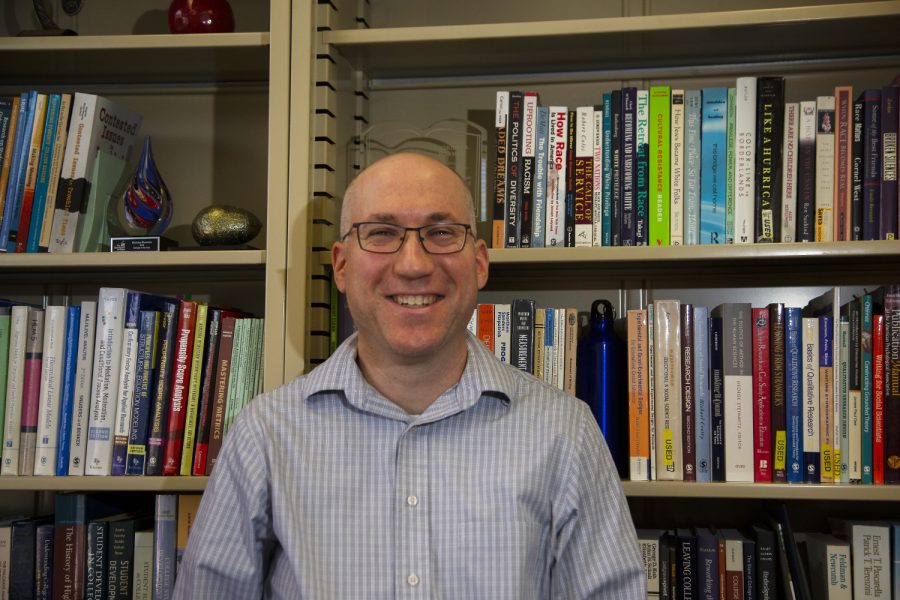Attending college has consistent long-term benefits, UI researchers say
University of Iowa Professor Nicholas Bowman teamed up with researchers across the country to examine the benefits of a college degree after graduation.
University of Iowa professor Nicholas Bowman is seen in his office located in he Lindquist Center on Monday, December 2, 2019. Bowman is the lead author in the research on what graduates get out of college once they have graduated.
December 9, 2019
Higher education outcomes in the lives of students, past and present, are constantly in question — especially in regard to financial burden. A University of Iowa researcher teamed up with three other institutions this fall to discover the psychological benefits of earning a degree.
UI Professor of Higher Education and Student Affairs, Nicholas Bowman, was the lead researcher on the paper, entitled “The Post-Collegiate Influence of Undergraduate Experiences: Intellectual, Civic, and Psychological Outcomes.”
Bowman said the study centered on the long-term return on investment in a nonfinancial means, a topic that he said isn’t the subject of much higher-education research.
“Looking at outcomes that are psychological in nature is important even if you only care about economics,” he said. “[This research] shows the importance of an educated workforce and society, even if it isn’t as apparent in how much money you make … Student outcomes are important both in the short and long term in research. Building literature about the idea of college in the long term, away from money, is crucial for people to see.”
Bowman said that this research focused on three central ideas: quality professors, academic challenges, and diverse interactions.
RELATED: UI Libraries aim to make a ‘scholarly impact’ on student research
“The fact that these three broad types of college experiences are consistently related to positive, long term benefits is really critical,” he said. “Our sample of alumni was over 20,000, which is a group larger than most [other] studies have.”
In an email to The Daily Iowan, Associate Professor at the University of Georgia Institute of Higher Education Gregory Wolniak said the research discovered an increase in intellectual development, civic development, and college satisfaction in both the short and long term.
Tricia Seifert, education department head at Montana State University and UI alum, co-authored the paper. When the project first started, Siefert said she didn’t expect the benefits to be as long term as the study found.
RELATED: University of Iowa president talks importance of resources in funding strategic plan
“The outcomes are interesting, to me, because students who report higher levels of academic challenge in college had long-term benefits in their intellectual and civic growth,” she said. “That suggests that we need to continuously invite students to wrestle with difficult material that challenges their assumptions and knowledge to date.”
Seifert said this research extends further than the present; the benefits for potential college students need to be recognized by a broader audience.
“The reason this research is so important is because higher education is a billion-dollar industry,” Seifert said. “It’s important for participants in higher education, parents of students, faculty and staff members, as well as stakeholders and legislators to know what the broadest return on investment outside of a financial perspective.”
Wolniak said that the importance of students engaging with quality teaching, being challenged academically, and having opportunities to interact with diversity cannot be understated. He also championed challenge as an important element of the collegiate experience.
“Undergraduates will hopefully benefit from evidence that having instructors who engage them, challenge them, and expose them to new ideas and assignments pays dividends well beyond the college years and in ways that extend beyond career success,” Wolniak said. “Put simply, learning requires challenge.”



